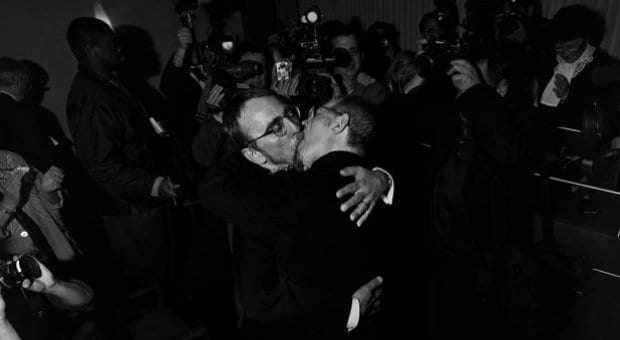Michael Hendricks and René Leboeuf won the right to get married 10 years ago in a landmark Quebec Superior Court ruling, on March 28, 2004. Four days later, on April 1, they became the first same-sex couple to be legally married in Quebec.
New Jersey native Hendricks — a veteran LGBT and AIDS activist who was part of Montreal’s legendary 1990s “Gay Brain Trust” — came to Canada as a draft dodger during the Vietnam War and met Leboeuf at a New Year’s party in Montreal in 1974. Hendricks and Leboeuf have been together for 40 years now, and their legacy looms large: after they won their court battle to get married, their legal victory forced Ottawa’s hand in Canada’s debate over same-sex marriage, which was legalized nationally in 2005.
Xtra sat down with Hendricks and Leboeuf to reflect on their trailblazing journey.
Xtra: It was a media circus at Montreal’s Palais de Justice when you guys applied for a marriage licence in 1998. As an old media pro, Michael, were you pleased at the auspicious start of your battle for same-sex marriage?
Michael Hendricks: All five TV networks and all the newspapers in Montreal were there. Immediately, we knew we were going to get the visibility we needed to proceed. The best part was the photo/article on the front page of Le Devoir, which would make [openly gay] Parti Québécois MNA André Boulerice shit: he had just declared that the Parti Québécois had given gays and lesbians “full equality” by including same-sex couples in the Quebec Civil Code’s conjoint de fait status. We proved him a liar on the front page of Le Devoir.
When the clerk refused your marriage licence request, how did it make you feel?
René Leboeuf: We expected rejection and needed written proof of that rejection in order to proceed with our suit.
Your court case began on Nov 8, 2001. Over the next years, what was the most difficult part about this legal battle and journey?
Hendricks: Putting up with the “know-it-all” lawyers we had at first who tried to dictate to us what we should do and say — very politically ill-informed people, with wacky ideas and enormous egos. But we were really lucky once we got rid of them and built a legal team that respected us and, in the end, carried the day in the Quebec Appeals Court. They attended our wedding as honoured guests.
Leboeuf: I didn’t like the incredible slowness of the Quebec court system, compared to Ontario, where they use the “case management” system. There was also the constant fundraising. The whole thing cost around $300,000 in lawyer fees. The personal financial cost to us was between $20,000 to $30,000.
Hendricks: As for the myth that “the gay community” is rich and paid for everything — they paid around $7,000 out of the $300,000. There was a lack of support from the LGBT community in general until we started to win. Then they were all over us like a cheap suit. We quickly learned what the term “success has many parents, while failure is an orphan” means. For example, one “community” lawyer pleaded for civil unions in court, which led the chief justice of the Quebec Appeals Court, Michel Robert, to ask him during the hearing for which side he was arguing.
How did you guys feel when you finally won?
Leboeuf: Thank god, it’s over!
Hendricks: We were tired after six years of constant hostility, constant fundraising, putting up with wacky lawyers and with sniping by members of the community — many of whom, incidentally, now take credit for having won the marriage battle and have gotten legally married after telling us for years how they rejected it in favour of civil unions.
What was your wedding like?
Leboeuf: Surreal. Among other things, the cameramen fought physically to get the best position to film us in the marriage chapel at the Palais de Justice. The ceremony was short, moving and beautiful. We thought we had thought of everything, but we completely forgot about a bouquet to throw to the wedding participants at the end.
Hendricks: At the very last minute, the political attaché of [then-Bloc Québécois leader] Gilles Duceppe showed up with a beautiful bouquet of white roses, which René threw to the crowd at the end.
How important do feel your 10th wedding anniversary is, both personally and publicly?
Hendricks: Personally, after our first 30 years together, 10 years is nothing. Nothing really changed in our everyday lives except our legal affairs, which, as a couple, are now straightened out. Publicly? At the time we were talking about moving a mountain. But today, 10 years later, same-sex marriage is accepted — trivial, in fact — and forgotten. That’s perfect, exactly what we hoped would happen. Today, gay and lesbian adolescents generally think that marriage always existed for them, which is exactly what we wanted to achieve back in 1998.
Your legal victory in 2004 forced Ottawa’s hand over same-sex marriage, which the feds legalized the following year. How do you feel about your legal and political legacy?
Leboeuf: Our victory assured that the Quebec Civil Code includes same-sex marriage, guaranteed not by legislation or by imposition from the Parliament of Ottawa, but by justice, won in trial before the whole community and under our own laws.
Hendricks: It also proved that the Charter works for minority, politically weak populations with no territorial base from which to launch a political campaign. Now Hendricks-LeBoeuf c Québec is taught in law schools as an example of how legal equality is established. In addition, it is presented to kids in their high school “Éthique et culture religieuse” course as just another form of marriage.
Read more about the first decade of gay marriage in Canada.


 Why you can trust Xtra
Why you can trust Xtra


